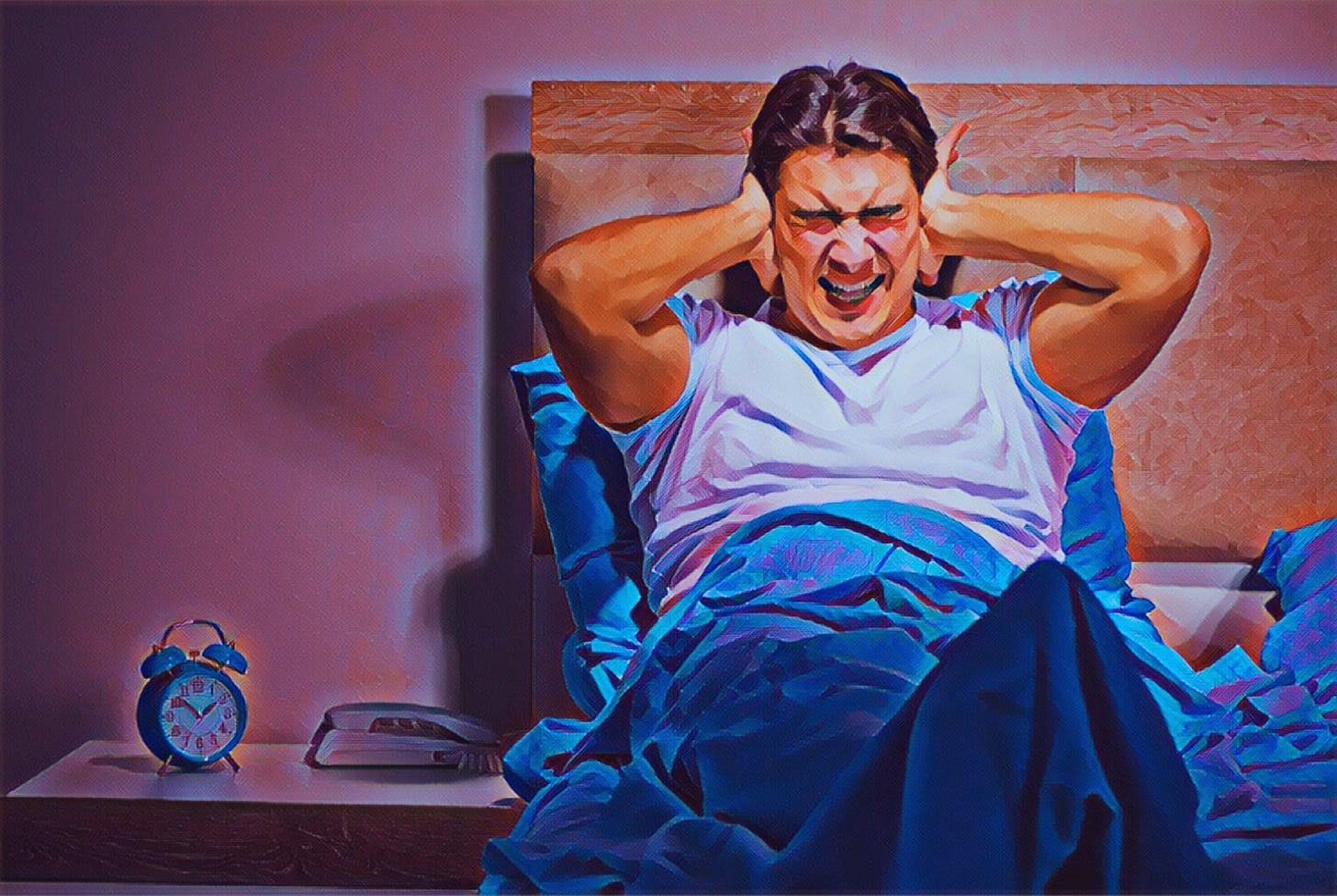Misophonia and Bipolar Disorder: How To Cope When Noise Makes You Angry (and Weekly Update)
Learning to cope with noise-induced anger and more.
Hi there!
One lesson became painfully clear during the rigors of tax season: I can’t do everything. I’m just one man with only 24 hours in a day.
Trying to write and publish content for a dozen sites is too hard. There’s simply not enough time for all of it. So, for the rest of 2023, I’m going to focus on simplifying my life.
And I’d love your help.
Don’t worry, the Sunday newsletter and Monday, Wednesday, and Friday Positivity Posts are here to stay, but some content and social media accounts will drop out of the loop.
It’s been a while since I’ve done a reader survey, so I hope you’ll take two minutes to answer some questions to help guide me.
There are only seven questions and three of them are optional. For everyone who submits a response and includes their email address, I will send you a special thank you gift.
As I get older and my illnesses zap more of my energy, I want to make sure I’m spending my time creating content you want to see. So please, do me a favor, and complete this questionnaire. The survey closes on Friday, May 19, 2023.
When you’re a writer, sometimes you have moments where a story sprouts and grows in your mind until you have to put it on paper. That’s what happened this week with a story about mending socks and garbage patches. Check out The World Started to Crumble When We Stopped Mending Our Socks.
Do noises ever make you angry or anxious? It could be misophonia. To learn more about misophonia, noise sensitivity, and how to conquer it, read the featured post below.
May is mental health awareness month. If there’s a topic you want to see me cover, please reach out and let me know. To help others learn more about living with mental illness, please share my content with your friends, family, and social media follows.
Spring is a time of intense ups and downs for me. I hope you'll understand if I’m a little all over the place. Much of my energy is going into creating two large projects for you. I hope to tell you more soon.
Thank you for being part of the Speaking Bipolar family. If you enjoy this content, please share this story with others.
Until next time, keep fighting.
Scott Ninneman
Click on ❤️ button to show your love to this post.
Featured Post:
Misophonia and Bipolar Disorder: How To Cope When Noise Makes You Angry

After a few minutes, I fantasized about ripping off his head and chucking it like an Olympic shot putter.
My hands were shaking and my antiperspirant was failing to keep up with the stress-induced sweat under my arms. Tests have always sent me into panic mode, and sitting for a professional license exam made the anxiety nearly unbearable.
Sitting a table away was a young man with dark, shaggy hair. With sagging jeans and untied high-tops, he looked like he should have been trolling a high school and not sitting in a room full of professionals trying to advance their careers.
He started with one thump. Lifting his thumb, he let it drop back to the table. Had he stopped there, my anger monster would have continued to slumber. But he didn’t.
Thump. Thump. Thump!
Each time, his thumb hit the table with a harder whack.
“Focus,” I told myself as a tried a breathing exercise to help me relax.
Then his other fingers joined in. Before long, all five fingers were drumming the desk with the intensity of a troop of marching soldiers.
I didn’t know the man, not even his name, so there was no reason for my intense reaction. As his fingers continued their march, the blood boiled in my veins.
Rather than concentrating on my next test question, I lost myself in fantasizing about the best ways to stop the noise. Ripping his head off was just one idea, and they got darker from there.
Disclaimer: I am not a medical professional and have not been formally diagnosed with misophonia. The information in this post is based on my experiences with hypersensitivity to sound.
Learning About Misophonia
I never heard of misophonia until a few weeks ago.
According to WebMD, “Misophonia is a disorder in which certain sounds trigger emotional or physiological responses that some might perceive as unreasonable given the circumstance. Those who have misophonia might describe it as when a sound ‘drives you crazy.’”
Wait, what? Other people feel this way too? And there’s a name for it?
I had no idea.
My whole life, I’ve struggled with noise, and it’s only gotten worse with age. It’s why my autistic friends think I’m on the spectrum.
People shouting makes me sick to my stomach. Loud chewing or slurping makes me shake with anger. Repetitive noises, like toes tapping or a ball being thrown against the wall, raise the scariest rage monster inside of me.
My aversion to noise is why I dislike eating with people and avoid sizeable crowds. I love music, but concerts are painful, so I rarely go.
While I may not clinically have misophonia, I certainly understand it.
Common With Bipolar Disorder
After I learned the name misophonia, I did an informal poll of my friends with bipolar and borderline personality disorder. Every one of them shared stories about how noises either made them angry or anxious.
Granted, this is a tiny sampling, but other anecdotal evidence seems to suggest noise sensitivity is extremely common with bipolar disorder. Whether it’s truly misophonia or not, those of us fighting bipolar seem to have similar experiences.
Triggers
Misophonia can have a range of triggers.
Even simple things like the sound of a clock ticking or water dripping from a faucet can set it off. Repetitive noises, like my young friend drumming his fingers, often induce more intense reactions.
Triggers are unique to each individual and can range from reacting to the sound of a pencil writing on paper to the beeping of alarm clocks.
Now I understand why so many of my alarm clocks have met an untimely end. Noise sensitivity is also why my cuckoo clock has not run in years.
Emotional and Physical Responses
Each individual’s response to a trigger also falls on a sliding scale. Some will simply feel uncomfortable or nervous, where others, like me, can run full throttle into rage and hatred.
Many people also report physical reactions to noise, including symptoms like severe headaches and nausea.
Other physical responses can include:
Sweating
Increased blood pressure
Tightness or pressure in your chest
Goosebumps
Faster heart rate
Fight-or-flight often comes into play with noise sensitivity, and you may feel an overwhelming need to flee.
How To Cope
Whether experiencing misophonia or noise sensitivity, there are a few ways to cope.
Identify your triggers
Learning how to identify your triggers is the first step. Once you know what causes your reaction, you can look for strategies to manage it. Some triggers you may be able to avoid or prepare yourself for in advance.
Reduce noise
Some people find that simply wearing earplugs or noise-canceling headphones is enough to reduce the effects of a trigger. Others may need more intensive care, such as cognitive-behavioral therapy (CBT), to gain better control.
Get help from your support team
Finding a good support system is essential. Talk to your doctor about the best therapy for your individual needs. It’s also good to share your difficulties with your close friends and family to help them understand. Having someone to talk to can help you work out the intense emotions coming from the noise response.
Use white, brown, or pink noise machines
White noise machines provide a consistent, soothing sound which can help drown out triggers. Pink and brown noise deliver a slightly varied sound that some people find more helpful.
Find coping mechanisms
Creating a distraction can help you deal with triggers. Exercise, meditation, or deep breathing routines can all help you stay calm and in control when faced with a situation that causes distress. Finding healthy outlets for your emotions is also key.

Takeaways
I never harmed the young man drumming his fingers on the table during my test. While the noise distracted me for a few minutes, a test moderator eventually came around and made him stop.
By practicing the methods listed above, most days I can handle repetitive noise without reaching a flash point. The worst days I still struggle, and I try to avoid noise and people at those times.
Noise sensitivity and misophonia are common issues for those with bipolar and other mental health disorders. There are a few ways to cope, including identifying your triggers, reducing noise levels, and finding coping mechanisms. Working with a therapist can also help you learn to better control your emotions.
Remember that you are not the only one struggling with noise issues. Many people experience the same symptoms. Finding support can make all the difference.
With understanding and patience, you can manage your noise sensitivity and live a more balanced life.
Additional Reading:
The World Started to Crumble When We Stopped Mending Our Socks
How To Throw Yourself a Good, Old-Fashioned Pity Party This Week
Support Speaking Bipolar
Every day, I am grateful for the chance to share my story of living with bipolar disorder hoping to help others. Writing has always been therapy for me, and I am passionate about making mental illness easier to understand.
However, running a website and creating content is not free, and I rely on ad revenue, product sales, and subscriptions to cover the costs of hosting, domain name registration, and email service.
If you enjoy reading my blog and find value in the content, please consider becoming a paid member of the Speaking Bipolar Positivity Club. Your support will help me continue writing and posting content that is uplifting and informative. Thank you!
Here are some ways, both free and paid, you can help support Speaking Bipolar and my content:
(Free) Forward my newsletter to a friend
(Free) Share links to my posts on social media
(Free) Follow me on Social Media
($) Leave a Tip
($) Join the Positivity Club as a paid member
(Free) Just keep reading this newsletter!
Suicide Prevention Resources
What Do You Want to See?
Are there other topics you would like to see me cover? Reply to this email or comment on any post.
Disclaimer:
This email may contain affiliate links. If you make a purchase through one of these links, I may receive a small commission at no additional cost to you.



That was really helpful. I hadn’t heard of misophonia before..